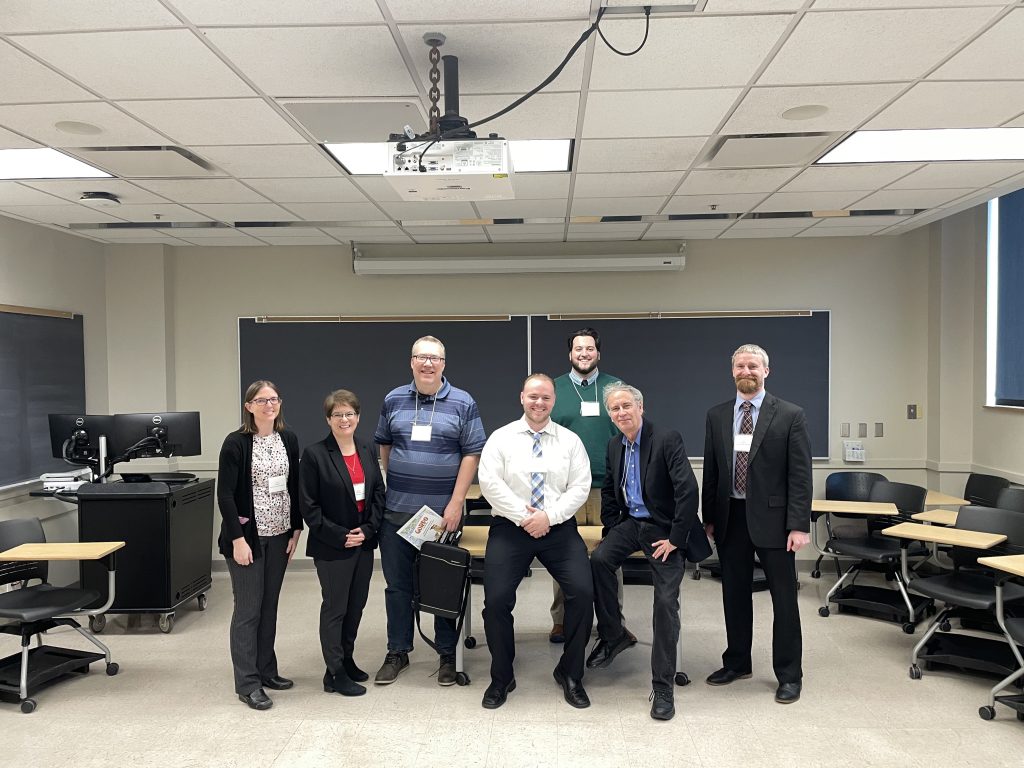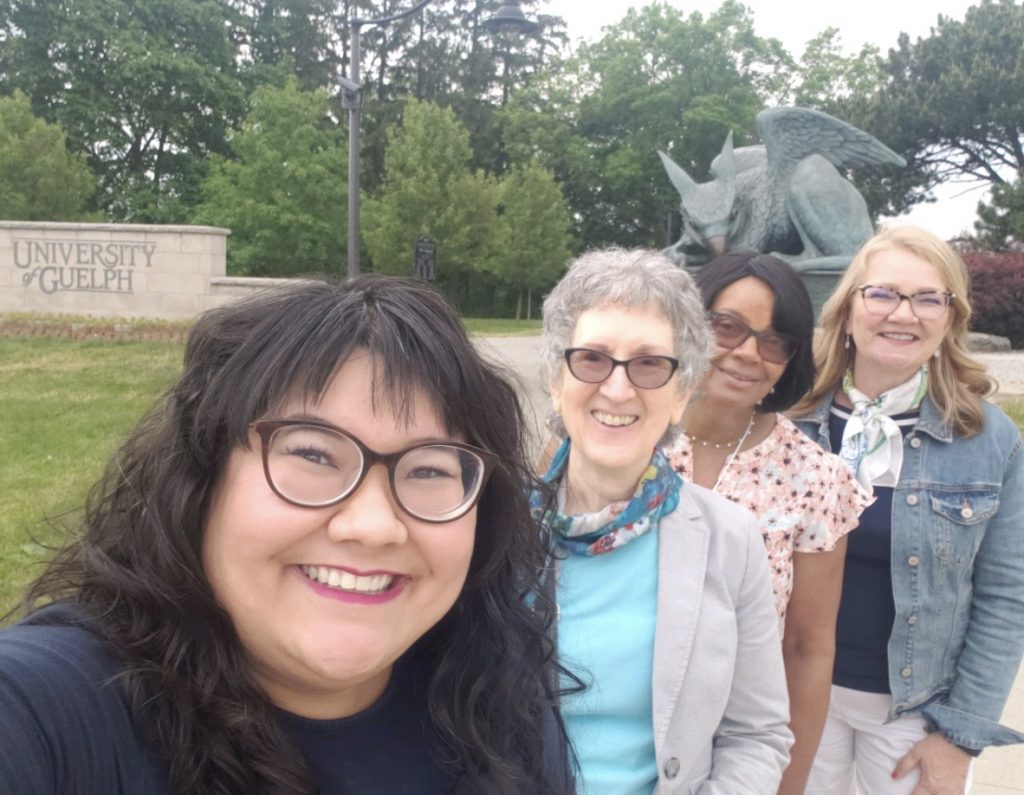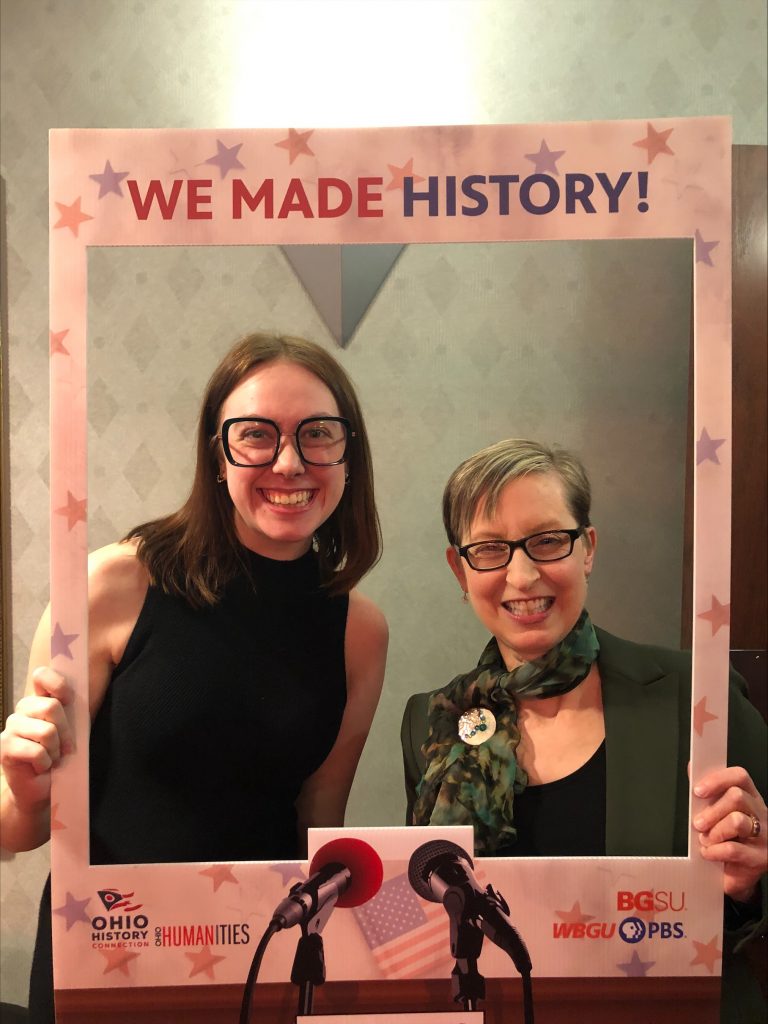Tags
BGSU alum Joe Faykosh was recently quoted in the New York Times article: Even Without Its Most Famous Son, Carter’s Hometown Remains a Destination.
Continue reading17 Friday Jan 2025
Posted in Alumni News
≈ Comments Off on BGSU Alum Quoted in the NY Times on President Carter’s Legacy
Tags
BGSU alum Joe Faykosh was recently quoted in the New York Times article: Even Without Its Most Famous Son, Carter’s Hometown Remains a Destination.
Continue reading17 Friday Jan 2025
Posted in Alumni News, Public History
≈ Comments Off on “Stories Inked in Skin” – Alumna Designs Unique Public History Experience in Texas
Tags
Heather Bloom (MA ‘21) is the Collections Manager at the Bastrop County Museum in Texas. She drew on her many experiences working with collections in Bowling Green and Toledo to design something innovative – a museum exhibit highlighting the stories behind Bastrop County residents’ tattoos.
Continue reading05 Thursday Dec 2024
Posted in Alumni News
≈ Comments Off on BGSU History Alumna Charts Course in Public History
Our alumni bring their knowledge and skills to a wide variety of roles. We interviewed one of our alumni, Maureen Mason (BA ‘10, Grad Certificate‘14), about her career at the National Veterans Memorial and Museum in Columbus, Ohio.
Continue reading21 Thursday Nov 2024
Posted in Alumni News, Faculty News
≈ Comments Off on Dr. Green Delivers Talk on the Life and Legacy of Ella P. Stewart
Dr. Shirley Green, Adjunct History Instructor at BGSU and the University of Toledo, delivered a talk on the Life and Legacy of Ella P. Stewart, one of the nation’s first Black female pharmacists.
Continue reading11 Thursday Apr 2024
Posted in Alumni News, Department News, Undergraduate Student News
≈ Comments Off on Past BGSU Student Jo Enger Arthur, Story, Legacy, and Study Abroad Scholarship
The Jo Enger Arthur Scholarship for Study Abroad encompasses a love of history, Europe and European language, and international studies, along with a strong passion for travel. This scholarship commemorates Jo Arthur, her life, legacy, and love of family and learning, especially about other people and their cultures.
29 Friday Mar 2024
Posted in Alumni News, Department News
≈ Comments Off on BGSU History Alum Shares Memory, Career, and Crossword Puzzles!
Tags
A few weeks ago we featured a crossword by Tim Beatty, a retired teacher and alum. Tim Beatty grew up in Swanton, Ohio, forty minutes northwest of Bowling Green. He attended Bowling Green State University (BGSU) between 1969 and 1976, earning both his Bachelor’s and his Master’s in history and American Culture Studies. He remembers fondly Robert Twyman as one of his history professors, enjoying the courses he taught.
Continue reading19 Tuesday Mar 2024
Posted in Alumni News, Department News, Events, Faculty News, Graduate Student News
≈ Comments Off on BGSU History Students, Alum at the 2024 Ohio Academy of History!
BGSU history faculty, students, and alumni attended the Ohio Academy of History Meeting last Friday and Saturday.
Dr. Mancuso and Dr. Martin attended to support grad students giving papers (Dr. Mancuso also gave an interesting paper on the history of hazing at BGSU). Chase Fleece, Chloe Kozal, McKade Schultz, and Andrea Freimuth (ACS) all gave excellent papers, as did Sara Butler-Tongate (University Archives). It was also good to see department alums attending and presenting papers. Don Eberle (PhD) and Jacob Mach (ABD, Purdue) gave well-received papers, and we also ran into Chris Blubaugh (MA).
Let’s look forward to next year’s OAH at Kent State!

27 Saturday Jan 2024
Posted in Alumni News, Public History
≈ Comments Off on BGSU Alum and Historian Hired at Hayes Museums
Tags
Historian with Diverse Background, Specialty in Victorian History, Hired at Hayes Presidential
Republished from the Rutherford B. Hayes Presidential Library and Museums News
When Josh Dubbert was a fourth-grader at Danbury Elementary School in Marblehead, his class toured the Hayes Home on a field trip.
That was the beginning of a life-long interest in presidential history and President Rutherford B. Hayes’ time period.
Continue reading28 Wednesday Jun 2023
Posted in Alumni News, Emeritus News, Faculty News
≈ Comments Off on BGSU Historians Come Together at Childhood Conference at University of Guelph
Tags
BGSU History, Childhood Conference, Dr. Christine Eisel, Dr. Lisa Rose Lamson, Dr. Ruth Wallis Herndon, Dr. Shirley Green, Emeriti, University of Guelph
By Professor Emerita Ruth Wallis Herndon, Ph.D.

Four historians, all alumnae of BGSU’s Department of History, made presentations and renewed collegial ties earlier this month at a conference organized by the Society for the History of Children and Youth (SHCY) and hosted by the University of Guelph in southern Ontario.
Continue reading25 Tuesday Apr 2023
Posted in Alumni News, Public history project, Undergraduate Student News
≈ Comments Off on Behind the Scenes of a Documentary: Emma Brown’s experience working on Trailblazing Women in Ohio Politics
Tags
alumni, BGSU History, Documentary, Emma Brown, Melissa Miller, Outreach, Public History, Trailblazing Women in Ohio Politics, Undergraduate work
Authored by Emma Brown (B.A. History, Media Production at BGSU, graduated December 2022)
Two years ago in April of 2021, I got an email from a professor I’d only ever had through an asynchronous class. It was the end of a school year spent fully online and this email was an opportunity I could only dream of. The absolutely incredible Dr. Melissa K. Miller of the political science department was working on a documentary and wanted me to be a undergraduate researcher that summer. The documentary was looking at Trailblazing Women in Ohio politics and with my history major and media production minor she thought I would be a perfect fit with the three other undergraduate researchers. Of course, I accepted!
